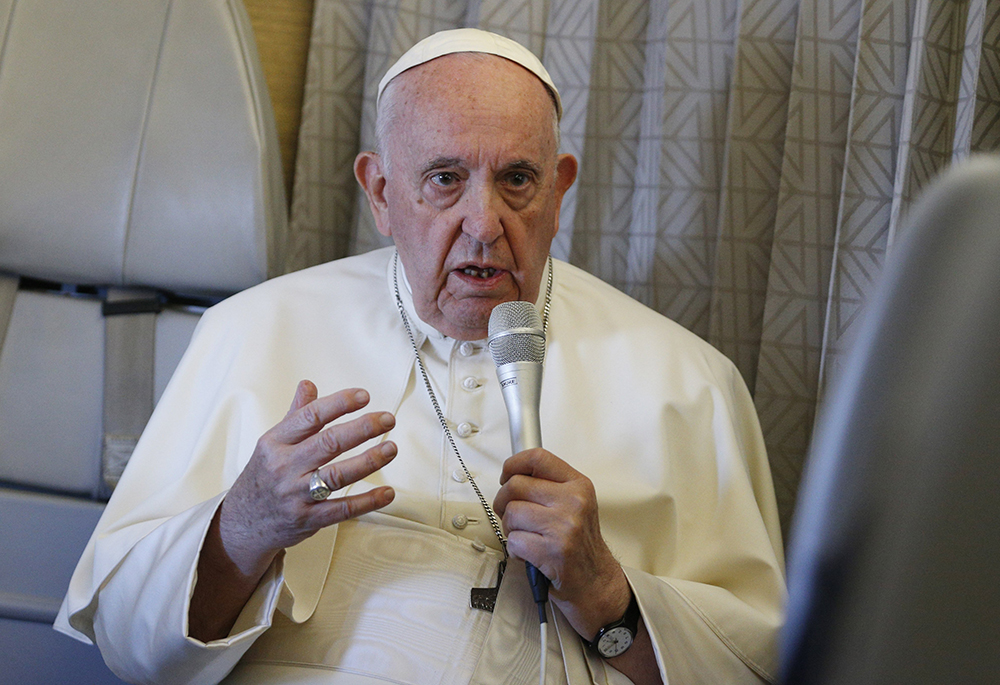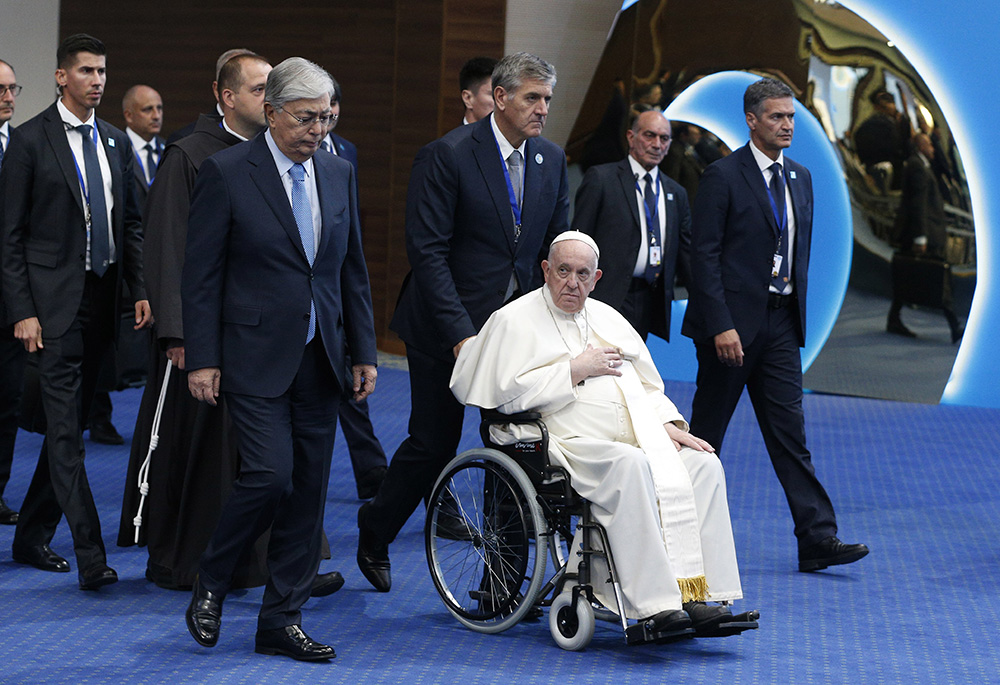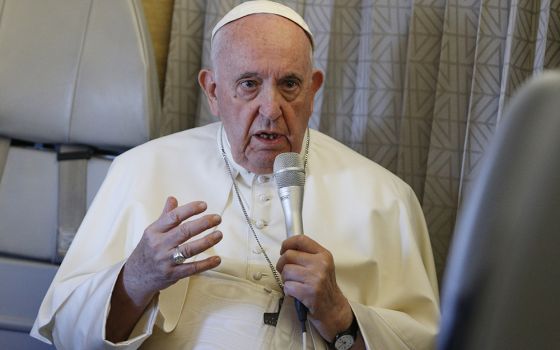
Pope Francis answers questions from journalists aboard his flight from Nur-Sultan, Kazakhstan, to Rome Sept. 15. (CNS/Paul Haring)
Pope Francis on Sept. 15 backed Ukraine's right to defend itself from Russia's violent, seven-month-long invasion, and, for the first time, appeared to lend his support to other countries that are supplying Ukrainians with arms and war material.
"To defend oneself is not only licit, it is also an expression of love toward one's homeland," Francis told reporters during the seven-and-a-half hour flight back to Rome following a three-day trip to Kazakhstan.
Francis characterized the decision of other nations to supply arms to Ukraine as a "political" calculation that "may be morally acceptable" under the right conditions. But he cautioned: "It can be immoral if done with the intentions of making more war."
While the pope backed Ukraine's right to self-defense, he also reiterated his earlier calls for dialogue between Russian and Ukrainian leaders. "I don't exclude dialogue with any power that is at war, even if it is with the aggressor," he said. "It may smell, but one has to do it."
While both the Vatican's secretary of state and its foreign minister have previously offered a cautious justification for supplying weapons to Ukraine, the pope's remarks marked the first time he had directly addressed the question.
Francis spent three days in Kazakhstan, a Central Asian nation and former member of the Soviet Union that shares a 4,700-mile-long border with the Russia Federation, as a participant in the 7th Congress of Leaders of World and Traditional Religions. The Congress gathered global interfaith leaders to promote coexistence and anti-extremism among world faiths.
During his first day in the country, Sept. 13, Francis blasted the war against Ukraine as "senseless and tragic."
On the following day, the pope criticized religious leaders who seek to justify war and violence, which was widely viewed as an implicit criticism of Russian Orthodox Patriarch Kirill, who has used religious language to justify his support for the invasion.
During the in-flight press conference, Francis also responded to questions regarding the Catholic Church's strained relations with both China and Nicaragua.
In August, Nicaraguan police arrested Bishop Rolando Álvarez, an outspoken critic of the country's authoritarian government, in a move that escalated long-simmering tensions between the government and the local church.
Within the last year, the government had also expelled the Vatican's ambassador to the country and evicted the country's province of the Missionaries of Charity, a popular religious order founded by Mother Teresa that cares for those who are economically impoverished.
When asked about the turbulent situation in the country, Francis said he hopes the sisters will eventually be allowed to return and offered a careful response, acknowledging that "there are problems."
While he said there are ongoing discussions between the country and Holy See officials, he said "it does not mean we approve everything that the government is doing."
Advertisement
On the question of China, where retired Hong Kong Cardinal Joseph Zen Ze-kiun — a prominent critic of the government — is set to face trial later this month on charges of failing to properly register an organization to help anti-government protesters, the pope said "it takes a lot of patience" to understand the country.
"To understand China takes centuries," he said, noting that the Vatican has "chosen the way of dialogue."
Francis described the bilateral talks between the two nations, which do not share diplomatic relations, as going well, but moving slowly.
The pope answered questions from reporters for just over 45 minutes. He also weighed in on the upcoming Italian elections, proposed legislation in France to legalize euthanasia and the rising secularization throughout Europe.
With regard to Italy, Francis refused to wade into the intense debates surrounding the national elections on Sept. 25, after which the far-right candidate Giorgia Meloni is widely expected to become the country's first female prime minister.
"Being a politician isn't easy," the pope said, going on to joke about the rapid turnover of Italian political leaders.
As France considers new legislation that would establish a right to assisted suicide, the pope rejected such proposals as "inhumane."
"The West has taken wrong paths," the pope said, adding that in many arenas, it has "lost its values."

Pope Francis and Kazakh President Kassym-Jomart Tokayev, left, arrive for the reading of a final declaration during the conclusion of the Congress of Leaders of World and Traditional Religions at the Palace of Peace and Reconciliation Sept. 15 in Nur-Sultan, Kazakhstan. (CNS/Paul Haring)
The 85-year-old pope, who continues to suffer from knee pain and relies on either a cane or a wheelchair to get around, also said he continues to keep traveling.
Francis told reporters that a November trip to the Kingdom of Bahrain is under review and that he intends to make good on his plans to visit the Democratic Republic of Congo and South Sudan. He said that the trip, which was supposed to take place in July but was postponed due to his mobility issues, could take place in February 2023.
Prior to leaving Kazakhstan on Sept. 15, Francis gave a final address to the interfaith leaders, exhorting them to continue to work together for the cause of peace.
"We, who believe in the Creator of all, must be on the front lines in promoting the growth of peaceful coexistence," he said.
"In the name of God and for the good of humanity: work for peace, not weapons!" said the pope. "Only by serving the cause of peace, will you make a name for yourselves in the annals of history."
While Francis did not name anyone specifically, the pope told reporters that he was aware that some had expressed skepticism of his interfaith outreach.
During the last day of the trip, auxiliary Bishop Athanasius Schneider of Astana, Kazakhstan — a longtime critic of Francis — said the pope's participation in a major summit of interfaith leaders could give the "dangerous" impression that the Catholic Church is part of a "supermarket of religions" rather than the "one true religion."
The pope defended his efforts, saying that he had been pleased to witness coexistence between Christians and Muslims in Kazakhstan and other places across the globe.
"I do not renounce my faith if I speak to another faith," said Francis.





